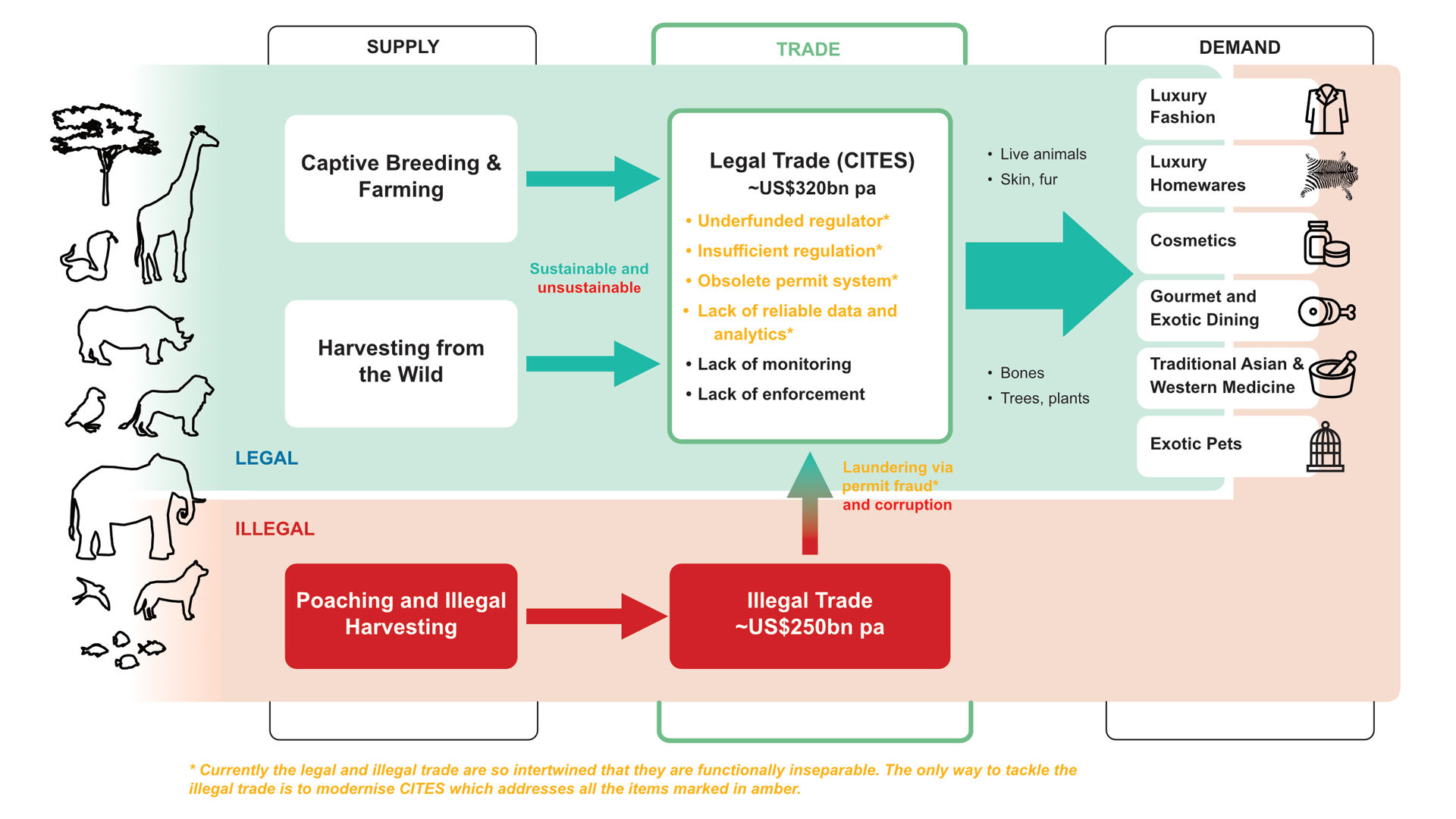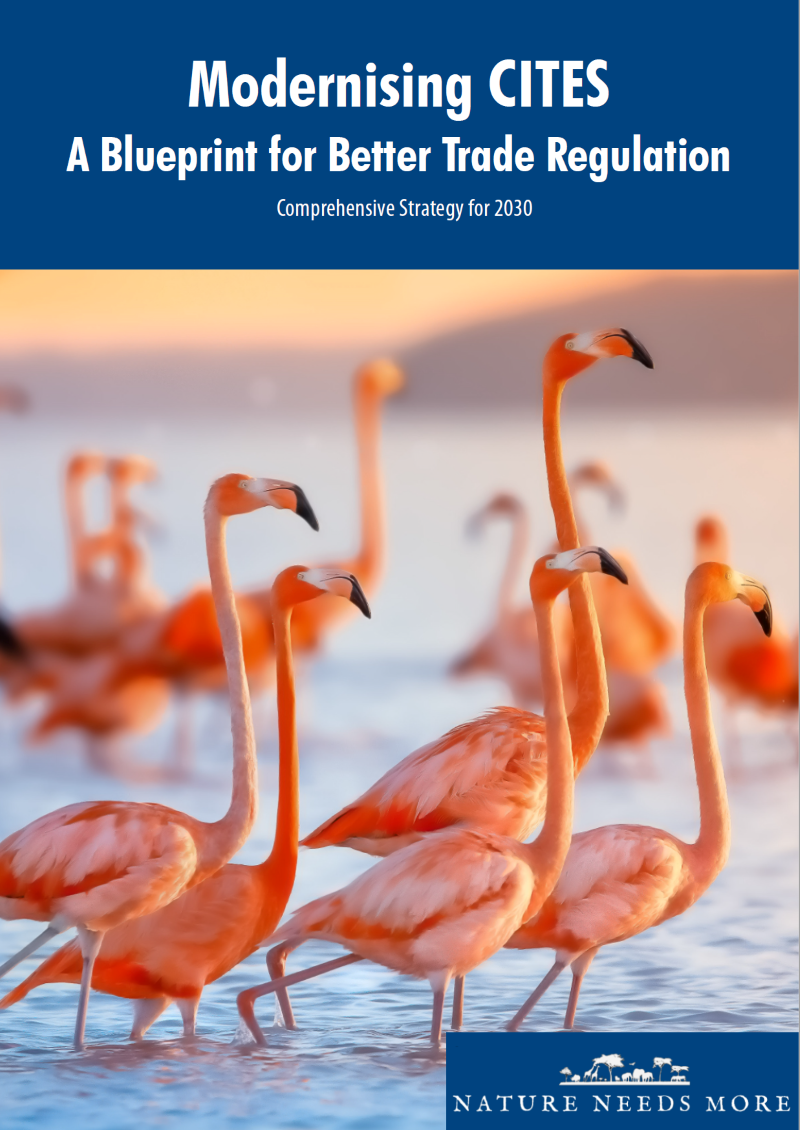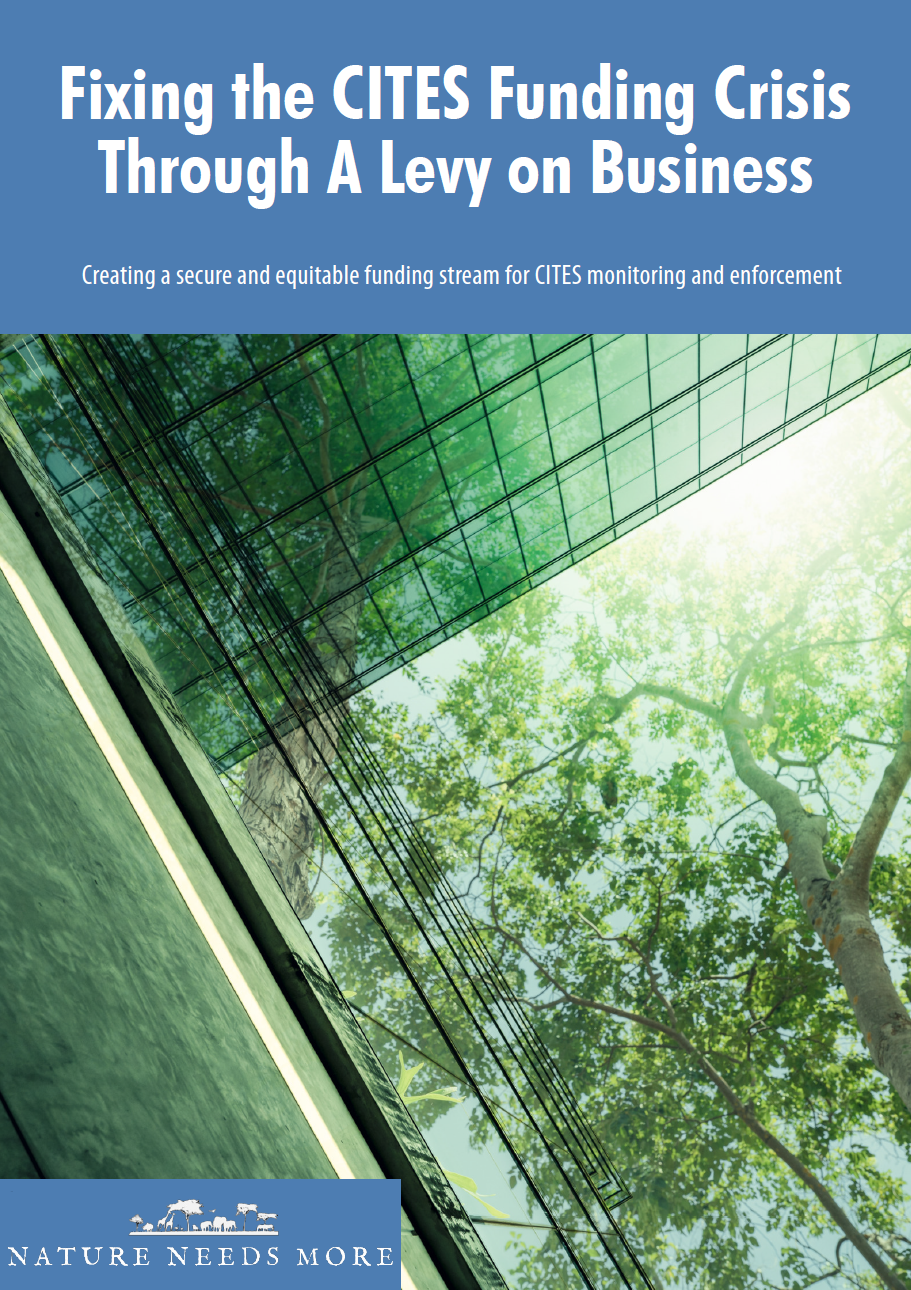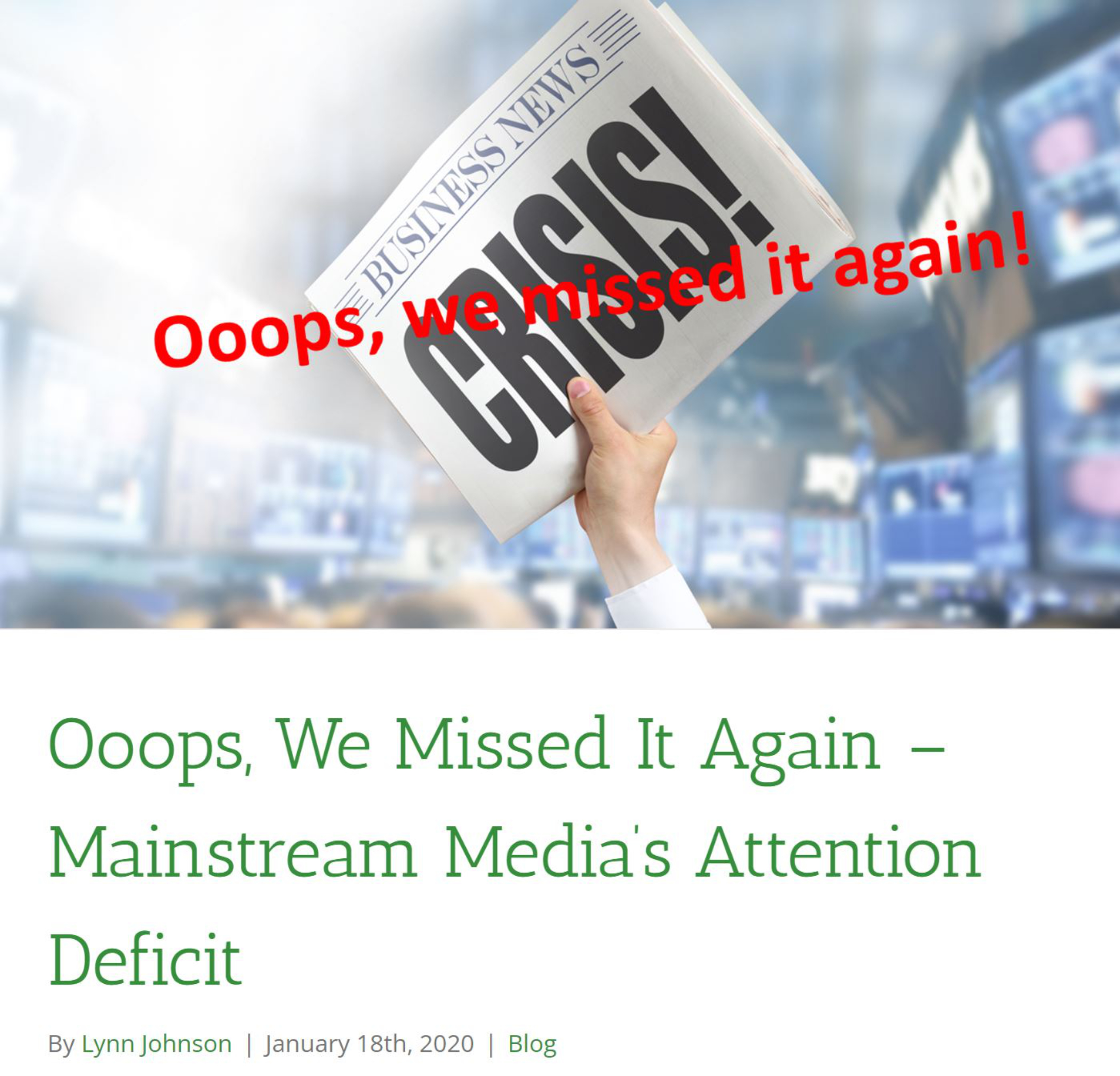
This week saw Nancy González, a Colombian designer whose customers are the likes of Victoria Beckham and whose products have been featured in The Devil Wears Prada, receive an 18-month prison sentence in the USA for smuggling. The maximum sentence available for González for illegally importing designer handbags made from caiman and python skin was 25 years.
The indictment charged Gonzalez, her company Gzuniga Ltd and two employees with one count of conspiracy and two counts of illegally importing reptile skin handbags between February 2016 to April 2019. Gzuniga was ordered to forfeit all handbags and other previously seized product and banned for three years from any activities involving commercial trade in wildlife.
The indictment detailed that the conspirators brought hundreds of designer purses, handbags and totes into the United States by enlisting friends, relatives and employees of Gonzalez’s manufacturing company in Colombia to carry the handbags or put them in their luggage while traveling on passenger airlines. Once in the United States, the bags were delivered or shipped to the Gzuniga showroom New York to be displayed and sold.
While the global attention on the Nancy Gonzales case is welcome, it also highlights yet again that the mainstream media (MSM) are no closer to breaking the story of the global scandal that the poorly regulated legal trade in wild species is a key driver of biodiversity loss. The landmark May 2019 IPBES report into the global extinction crisis confirmed that direct exploitation for [LEGAL] trade is the second most important driver decline and extinction risk for terrestrial species.
The MSM’s lack of interest in the legal trade in wildlife, which a 2016 EU parliamentary report called “one of the most lucrative trades in the world”, means we currently have no chance of mitigating the existential crisis we collectively face.

After seafood, fashion and furniture are the two industries profiteering most from the wildlife trade. The scale of trade, the poor quality and impoverished regulatory system and the ease of laundering illegal products into legal supply chains means all the problems with this trade have been hidden in plain sight for decades.
What the MSM chooses to do, in the few instances it even bothers to report on the legal wildlife trade, is evidenced in their mention in passing approach to CITES (the Convention on International Trade in Endangered Species of Wild Fauna and Flora), which allows the legal trade to fly under the radar.
“Although trade in the skins used by Gonzalez was not prohibited, they came from protected wildlife that requires close monitoring under the Convention on International Trade in Endangered Species of Wild Fauna and Flora, known by its initials as Cites.” The Guardian
“The trade in caimans and pythons is not banned, but is strictly regulated under CITES rules. Gonzalez never secured the necessary import permits required by regulators” The BBC
“The species are protected wildlife that require close monitoring under the Convention on International Trade in Endangered Species of Wild Fauna and Flora – known by its initials CITES.” Yahoo News
“The trade in the reptiles is not banned, but is strictly regulated under CITES rules.” The Standard
There is more of the same echo chamber, mention in passing reporting in The Washington Posts, Forbes; the list goes on-an-on.
The lack of MSM investigation into the global scandal of the poorly regulated, legal wildlife trade means that the stakeholders pushing the commercialisation of wild species never have to prove that trade practices are sustainable.
Fact Check: A History of Problems#
The Guardian did hint at one of the issues, “In 2016 and 2017, [Gonzales] was warned by US officials against sidestepping such rules, making her conduct particularly “egregious””. Yes, year-after-year of nothing more than “warnings” precede any real action, if indeed real action comes at all.
For example, a 2020 paper, Luxury Fashion Wildlife Contraband in the USA, stated “The fashion industry is one of the largest markets for illegal wildlife products.”. The research showed that between 2003 and 2013, thousands of exotic leather goods were seized by U.S. law enforcement because of discrepancies in CITES paperwork, with Ralph Lauren accounting for 29% of the seized items, Gucci (16%), Michael Kors (10%), Jil Sander (6%), and Coach (5%).
The problems these seizures exposed didn’t lead to an investment in the regulation and monitoring systems, to improve supply chain transparency, either domestic (USA) or international under CITES. All this resulted in was companies lobbying the US government to redact company names in any Freedom of Information Act (FOIA) requests by those investigating this CITES listed trade in wild species. Undoubtedly companies realised that having their brands linked to reports of these confiscations could be detrimental to their reputations. The US government complied with their requests.
The problems, exposed over decades, haven’t led the MSM to fact check their statements alluding to CITES credibility. While the MSM continues to ignore this, public awareness and pressure on governments for change remains low. Worse still, the fact that the legal trade in wild species gets almost no exposure, the flaws in the regularly systems have increased over time, as proportionality less funding is available to monitor a growing list of species.
Fact Check: Exhibitions Loopholes#
The Guardian and other outlets also mentioned a fact that was used by González legal team to explain her actions “They argued that the merchandise she imported into the US were samples for New York fashion week and other events.”. Why is this interesting? Because too often trade in CITES listed species that is not classified as commercial, such as exhibitions, will get less scrutiny on export and import. This highlights why all fashion weeks need a policy on how they promote designers who use CITES listed species in their collections.
Fact Check: Columbia#
While Gonzalez just received her 18 months sentence in the USA, she was initially arrested in July 2022 in Cali, Colombia before being extradited to the United States. Columbia still uses an obsolete 1970s CITES paper permit system to export from the country. In September 2023, the CITES Secretary General, Ivonne Higuero wrote, “Unfortunately, problems can arise with the use of paper documentation, including fraudulent use. Complications in keeping track of documents during issuance, transportation, and verification could result in forged paper documents. This may involve declaring false information, altering documents, reusing them, or even theft. There also have been cases where lost paper permits were used illegally due to delays in reporting and the extended duration of subsequent notifications among Parties.”.

And in July 2023, CITES previous Secretary-General, John Scanlon, commented on Boston’s News Station, WBUR, “We have a paper permitting system which is a 50-year-old permitting system that’s open to fraudulent use and corruption, whereas in 2023 we should have a fully automated system”.
In 2024, Columbia is due to host the UN Convention on Biological Diversity, CoP16, a treaty with three main goals: conservation of biodiversity; sustainable use of biodiversity; and the fair and equitable sharing of the benefits arising from the use of genetic resources. Should any country, who still uses a 1970s paper system to facilitate its export of endangered and exotic species, a system known to be open to fraudulent use, be able to host a conference that is about ensuring trade is sustainable and legal by 2030?
Saying this, it is important to not single out Columbia because every other country in central or south America, including Panama who hosted CITES CoP19 in 2022, still use a 1970s paper permit system to facilitate the lucrative trades in wild species. In fact only 19 of CITES 183 signatory countries (Amber) have modernised from a paper to a digital system. From a regional perspective, Europe is the laggard, with only 3 EU countries modernising their CITES trade system, even though this region is the biggest profiteer from the trade in wild species.

Fact Check: USA#
Domestically, the USA LEMIS system is held up as the gold standard worldwide, for domestic monitoring the legal trade in wild species at the US border. Yet in February 2024, a paper, US wildlife trade data lack quality control necessary for accurate scientific interpretation and policy application by Bruce Weissgold (ex USFWS) states: “Based on firsthand experiences with the creation and application of LEMIS data, this manuscript describes a variety of errors, biases, omissions, and an overall lack of data quality assurance. An independent audit of the LEMIS wildlife trade database and the service’s policies, procedures, and protocols for managing this system is needed. Additional recommendations are also offered to develop better management standards and bring greater resources for managing LEMIS…..The specialized user community of LEMIS import–export data—principally NGOs and intergovernmental organizations and federal government agencies—are sometimes aware of the system’s shortcomings. However, they have engaged in virtually no efforts to improve and correct these data. As such, those groups, particularly NGOs which have regular contact with the US Congress’ appropriation processes, should assist USFWS in improving the management and administration of LEMIS to better ensure the accuracy of the data through the establishment of quality control measures and greater transparency measures and public access”.
Weissgold describes the same situation domestically with LEMIS as is observed internationally with CITES. When the media, including what may be seen as the progressive MSM, have missed so much for so long, you must ask, is this intentional or incompetence? A critical question, given the links between pandemics and the global wildlife trade.
Fact Check: Sustainable Use#
There is a widespread belief in both conservation agencies and the wider public that ‘sustainable use’ of wild species is both possible and desirable but currently there is no proof of this. This lack of proof was reiterated in the last week, with a publication investigating what conservation strategies are working. Described by some as ‘one of the biggest scientific papers’ or ‘first study of its kind’ or “as rigorous as it gets”, it was a global meta-analysis of 186 studies (including 665 trials) that measured biodiversity over time and compared conservation outcomes. The authors concluded, “The impact of efforts toward sustainable use of species is inconclusive”. Why? Because they could only find 5 studies on sustainable use that fit the selection criteria.

This is a sad indictment of the sustainable use model. Given we have a 50-year old convention, CITES, whose primary objective is protecting endangered species from overexploitation through trade (aka: sustainable use), it is telling that only 5 papers could be found for this. The criteria for the analysis was that specific conservation actions could be tracked over time (as opposed to geographical area). This should have provided the perfect opportunity for the CITES convention to prove that its current model had worked over the last 50 years. It obviously couldn’t.
Fact Check: Too Few Investigations Of This Global Scandal#
All this points to the importance of the Earth Journalism Network’s CITES Legal Trade Journalism Fellowship, launched in 2023. Tracy Keeling, the inaugural recipient, spent 12 months investigating the legal trade and pitching stories to the mainstream media. Tracy’s linked article, End Extinction Silence, reflecting on her experiences of the year is very telling and a must read for anyone concerned about biodiversity loss. A comment in the article illustrates this point, “Within the fellowship, I have been trying to place stories in publications on a freelance basis. Although I have succeeded in some instances, the pickup by media outlets was much less than I and EJN had hoped it would be. Every freelance journalist knows there is always a certain level of rejection involved in pitching stories. But the rate of knock-backs surpassed what would normally be expected”.
Sixth Great Extinction Isn’t Getting the Attention It Deserves, in Sentient Media, again highlights what is needed, “Eliminating the biggest threats to biodiversity globally will require an overhaul of the status quo. This means that factory farming, the wildlife trade, and the fishing industry are all in need of urgent reform.”.
We can’t get past the status quo of the legal wildlife trade driving biodiversity loss while the MSM don’t want to investigate this.
As readers we must ask ourselves why. As the Nancy Gonzales case highlights, the wild species traded under the CITES are used as the ‘raw materials’ in luxury industries. The luxury industry may be the one of last advertisers in the MSM; on average, they divert 8% of their turnover into funding advertising initiatives. Could this provide the insight as to why “the rate of knock-backs [by Keeling] surpassed what would normally be expected“?
We can’t wait 200 years for the MSM to acknowledge it was complicit in ignoring this issue, in the same way that The Guardian is now investigating historical links between John Edward Taylor, the journalist who founded the Manchester Guardian in 1821, and transatlantic slavery – as well as researching the investments and business activities of the 11 other men who loaned money to start the newspaper.
It is important to know that a solution to problems associated with the trade in ALL wild species was tabled as far back as 1981, at CITES CoP3, which is moving to a reverse listing model. A move to a reverse listing model would mean that CITES would regulate the international trade in ALL wild species, including the international fishing and timber trade.
We must face up to the fact the biodiversity loss is not the result of poverty but the desire for huge profits and luxury products. The crudeness of this manufactured desire is being played out currently, again in the USA, with Hermès sued in California over claims “only those consumers who are deemed worthy of purchasing a Birkin handbag will be shown a Birkin handbag [in a private room]”. Really?! This is what is deemed important.
The world is selling out its wild species to create hugely profitable and unnecessary products for the greedy and desperate, and an unproven strategy – sustainable use – is being used to justify this.





